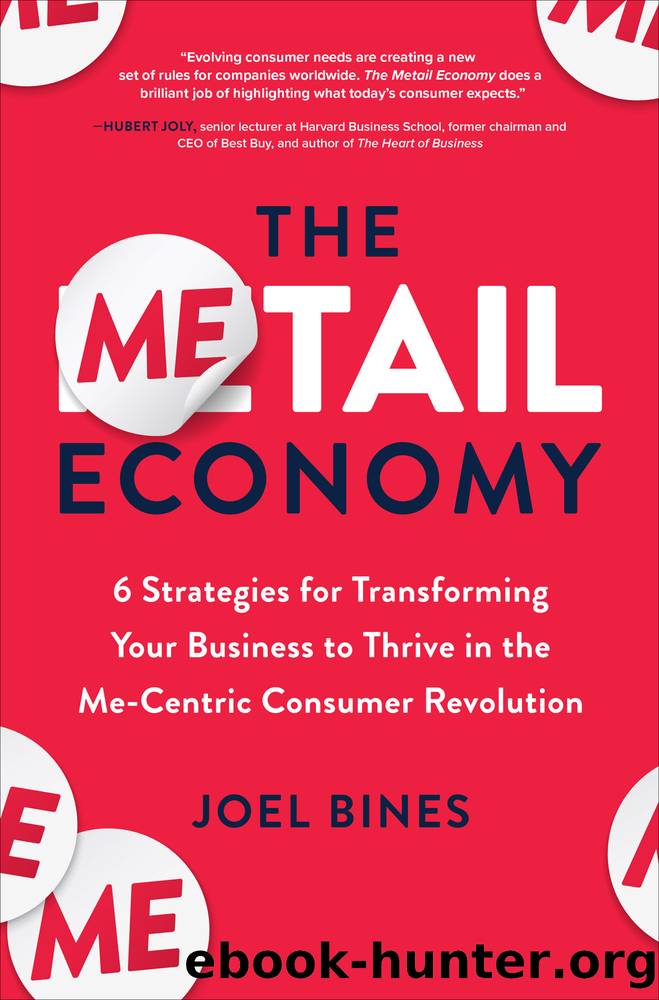The Metail Economy by Joel Bines

Author:Joel Bines
Language: eng
Format: epub
Publisher: McGraw Hill LLC
Published: 2022-01-15T00:00:00+00:00
Killing the Category Killers
For decades, big-box category killers obliterated small neighborhood stores. Category killers provided average service, an average range of products, and an average experience. Their competitive model was basically to accumulate stuff inside a cavernous space. If youâve read this far, you can see why thatâs not going to work as well in a Metail world. They stock products under the bell curve, locating their stores in large off-mall locations, in the hope that will be enough to attract the sheer volume of consumers it takes to make a profit with this model.
And the formula worked, for a period of time. Book chains like Barnes & Noble and Borders ate up the small neighborhood bookstores. Local music and movie stores got razed by Blockbuster, HMV, Tower Records, and Virgin Megastores. Toys R Us ravaged the mom-and-pop toy stores. Until a new model emerged: the category killer killer, called Amazon. You see, killing a category is a strategy that could work for only so long.
Best Buy was also a category killer at one point, but unlike the aforementioned retailers, it realized (before it was too late) that killing categories is not a viable long-term strategy and went all-in to become a category expert. Going back a few years at the height of Amazonâs competitive strength in electronics and computers, if you walked into a Best Buy, it was nearly impossible to find a sales associate who could explain why a certain laptop was better or guide you through the purchase of a home entertainment system. That was because, in an effort to plug the companyâs profitability hole, Best Buy executives cut cost after cost without regard for the effect on the customers.
I remember a time when I asked a question about one of the dozens of printer models in the store and was answered with a shrug: true story. Then, in 2012, Best Buy did something unthinkable. It hired Hubert Joly, a CEO who had no retail experience, although he did have his own personal experience as a Me. He began a multiyear campaign to fix the company, leaning heavily on the category expert model. Best Buy reshaped its entire approach and cost structure to become a place where customers could ask questions and get experience-based answers. While the smart money left Best Buy for dead like all the other category killers swallowed up by Amazon, a funny thing happened. The Meâs came back.
This allowed Best Buy to pivot toward more expertise and value-added services, and that emphasis on expertise is precisely what saved it from obsolescence.
Download
This site does not store any files on its server. We only index and link to content provided by other sites. Please contact the content providers to delete copyright contents if any and email us, we'll remove relevant links or contents immediately.
Influence: The Psychology of Persuasion by Robert B. Cialdini(4796)
The Miracle Morning by Hal Elrod(4727)
The Hacking of the American Mind by Robert H. Lustig(4383)
Pre-Suasion: A Revolutionary Way to Influence and Persuade by Robert Cialdini(4232)
Unlabel: Selling You Without Selling Out by Marc Ecko(3663)
Ogilvy on Advertising by David Ogilvy(3622)
Hidden Persuasion: 33 psychological influence techniques in advertising by Marc Andrews & Matthijs van Leeuwen & Rick van Baaren(3565)
Purple Cow by Seth Godin(3203)
Who Can You Trust? by Rachel Botsman(3133)
Kick Ass in College: Highest Rated "How to Study in College" Book | 77 Ninja Study Skills Tips and Career Strategies | Motivational for College Students: A Guerrilla Guide to College Success by Fox Gunnar(3129)
The Marketing Plan Handbook: Develop Big-Picture Marketing Plans for Pennies on the Dollar by Robert W. Bly(3062)
This Is Marketing by Seth Godin(3038)
I Live in the Future & Here's How It Works by Nick Bilton(2997)
The Power of Broke by Daymond John(2986)
The Tipping Point by Malcolm Gladwell(2921)
Building a StoryBrand by Donald Miller(2912)
The 46 Rules of Genius: An Innovator's Guide to Creativity (Voices That Matter) by Marty Neumeier(2855)
Draw to Win: A Crash Course on How to Lead, Sell, and Innovate With Your Visual Mind by Dan Roam(2784)
Market Wizards by Jack D. Schwager(2700)
